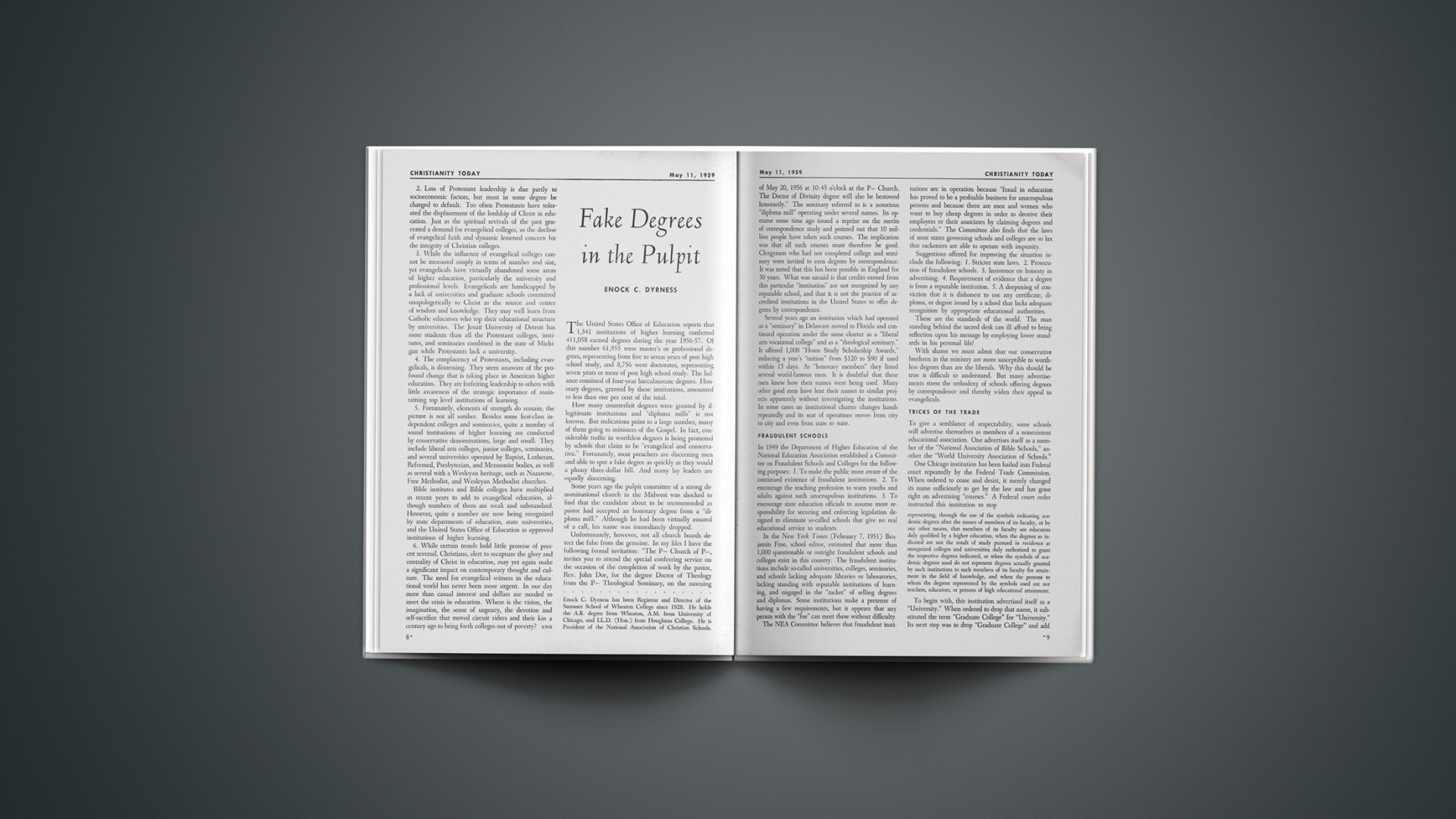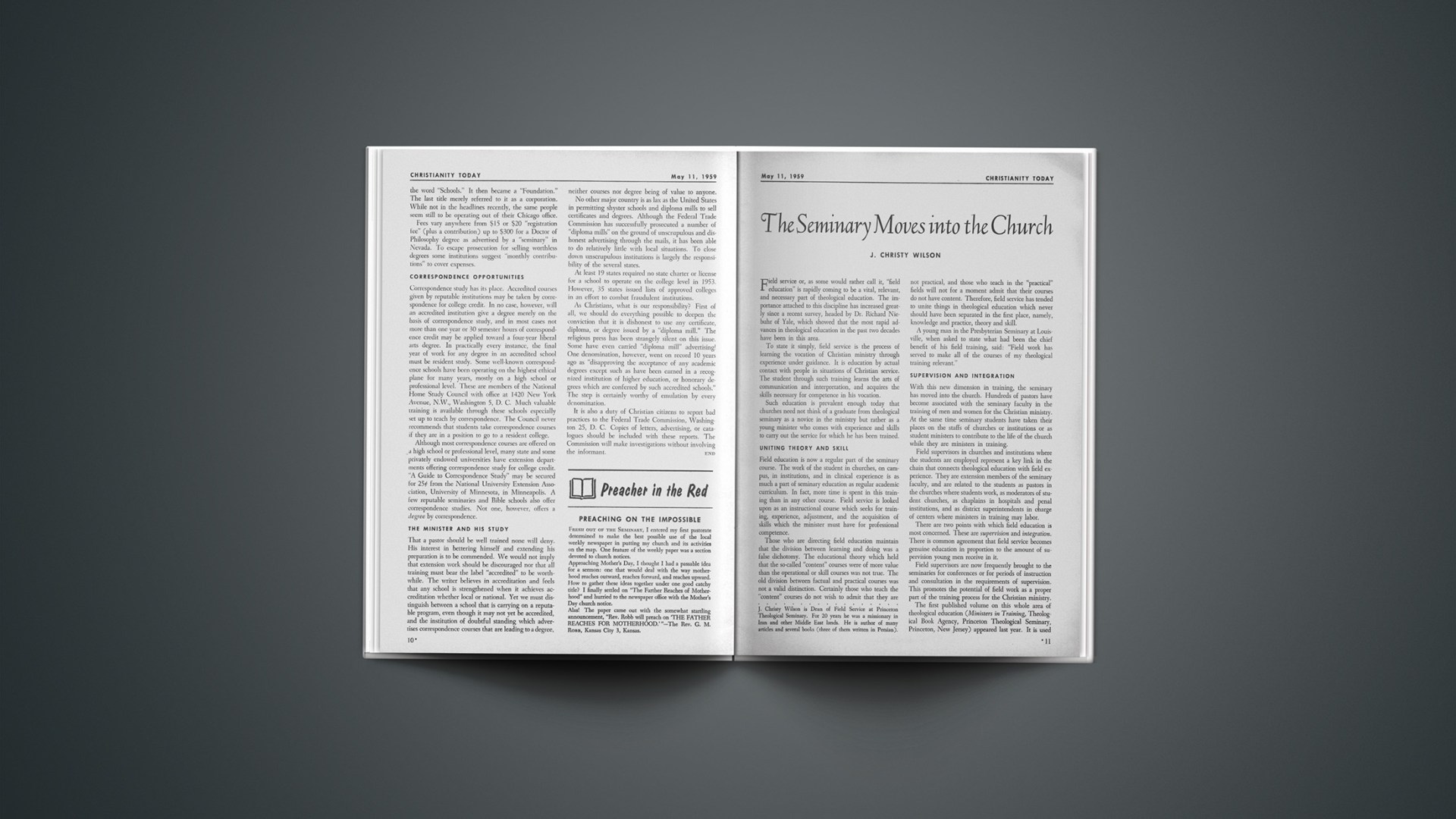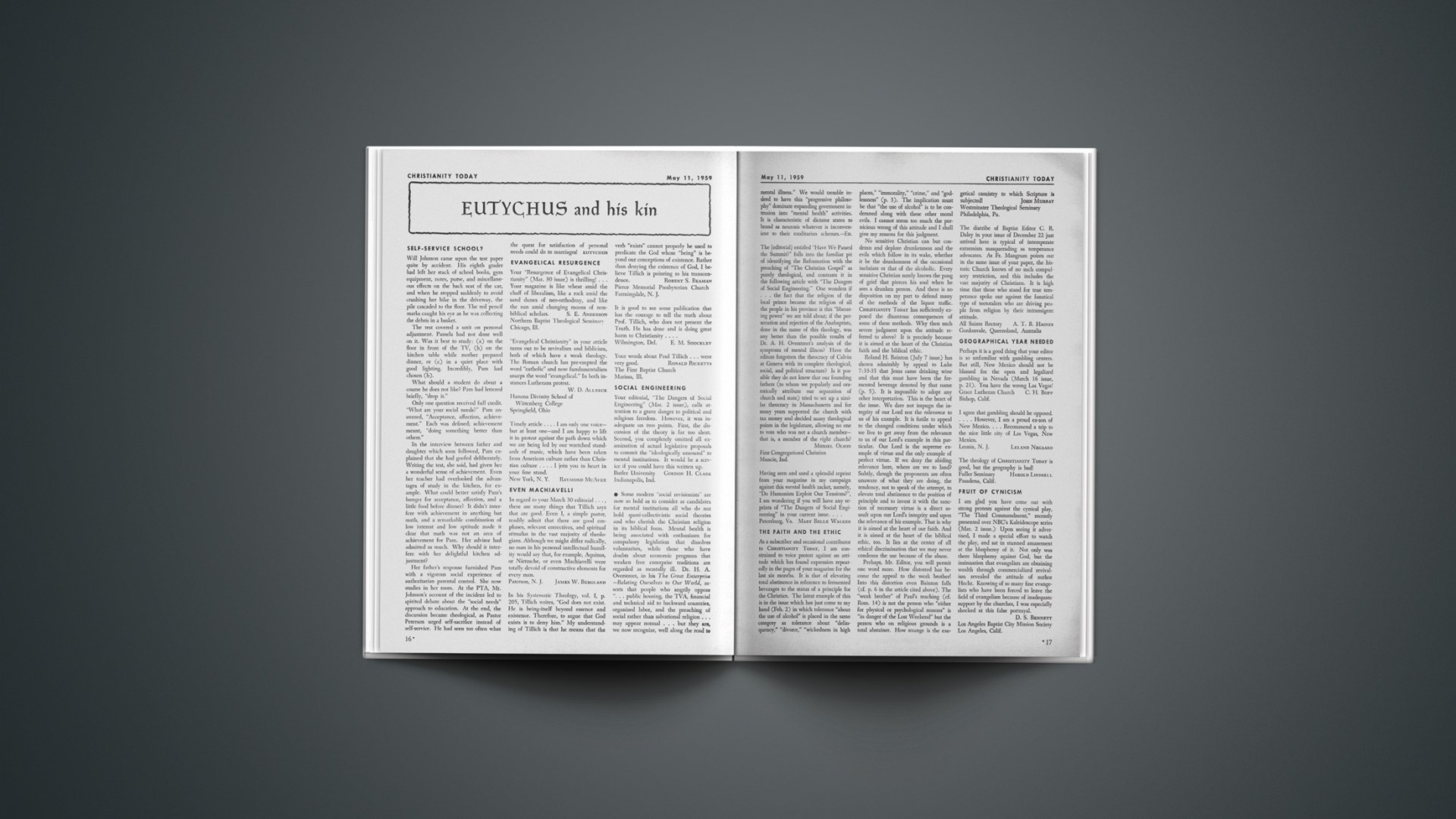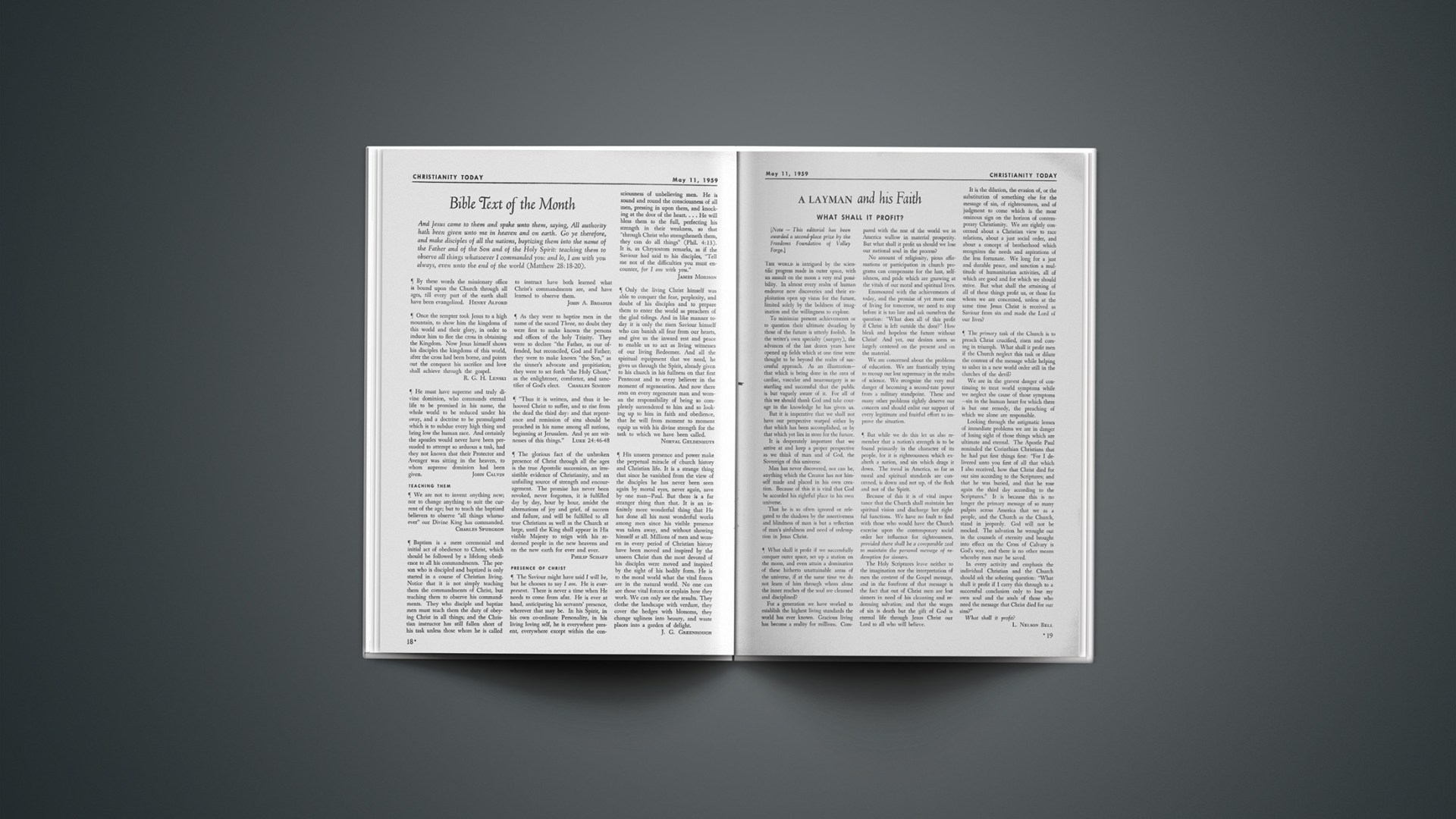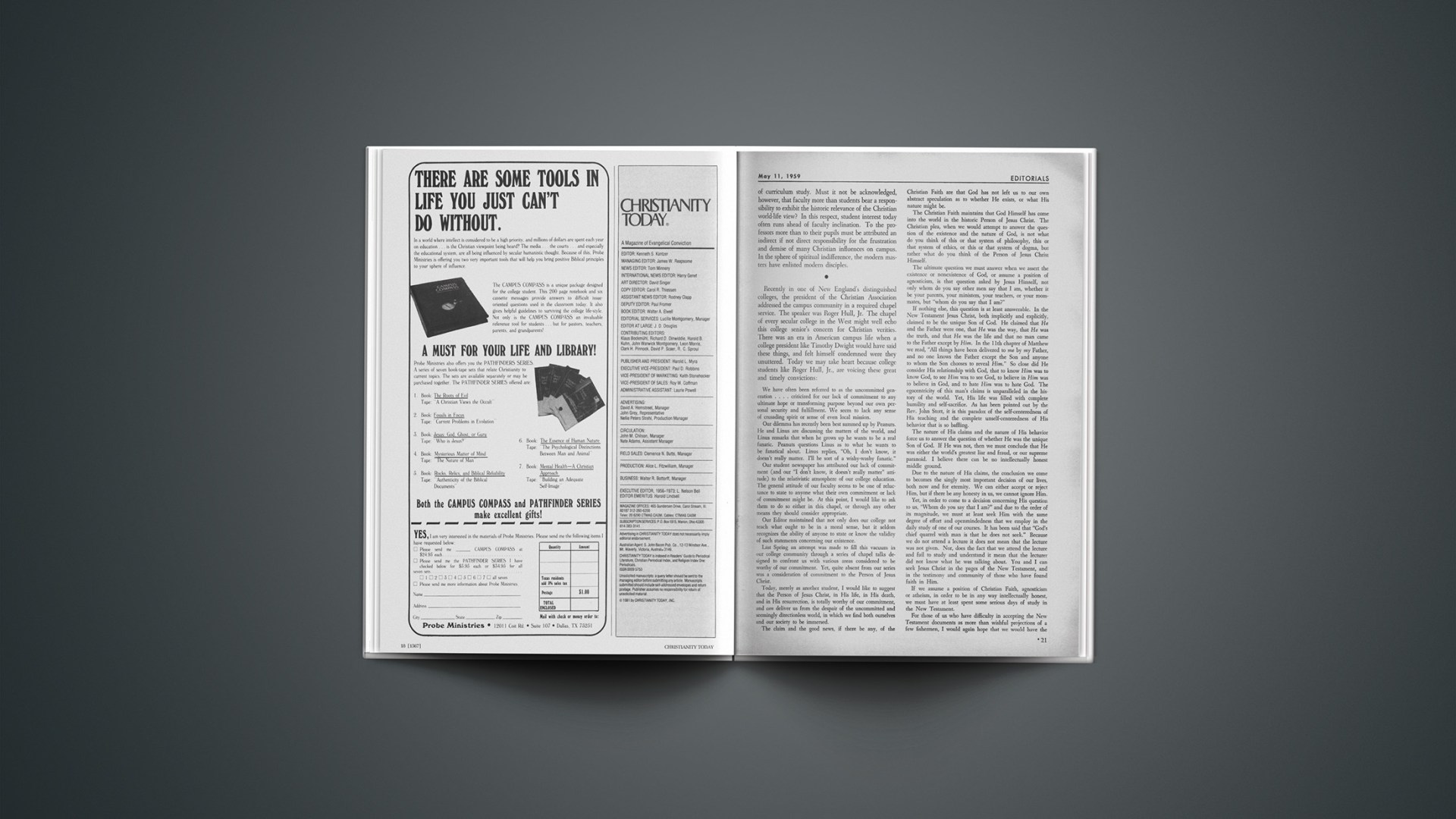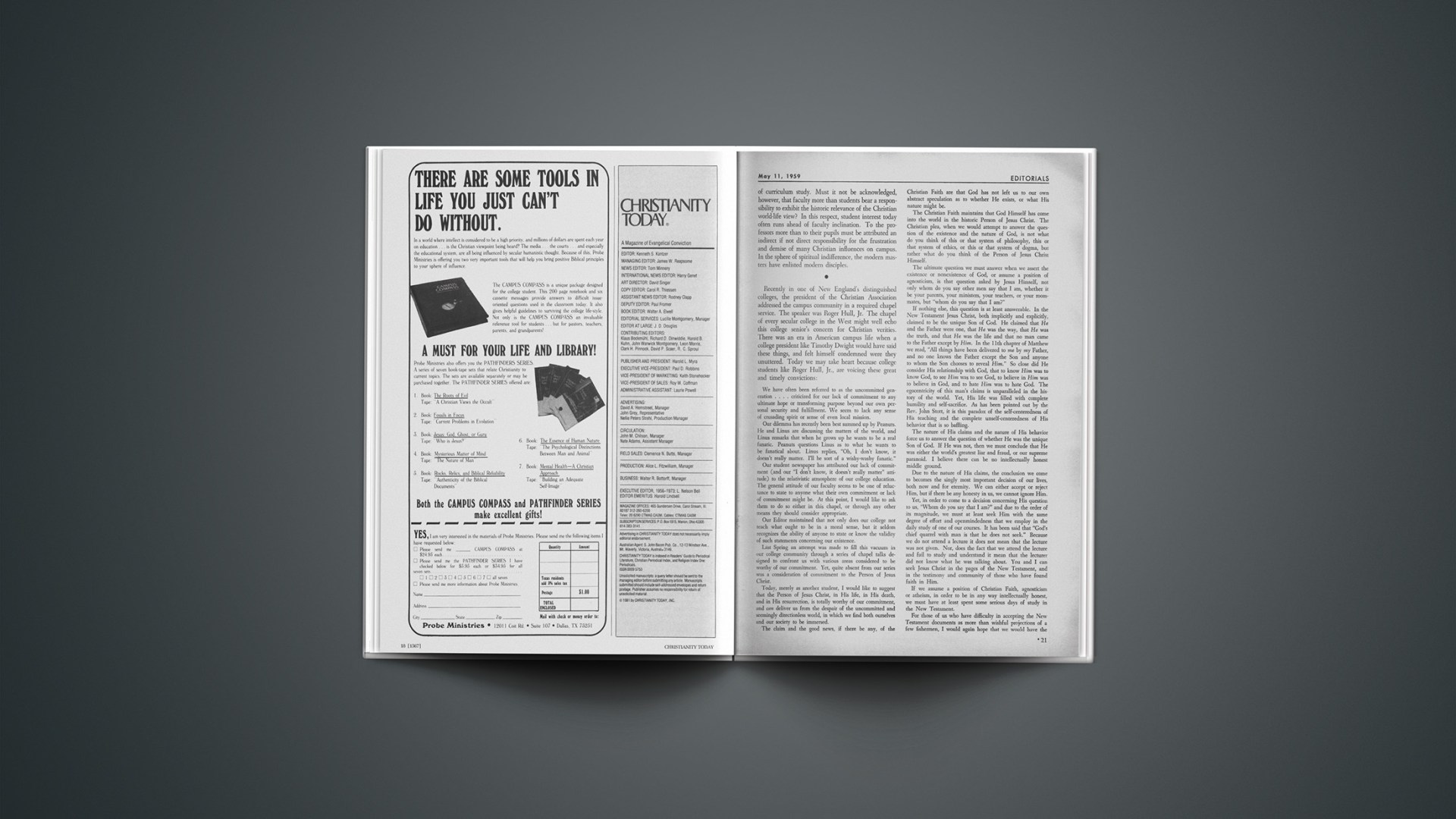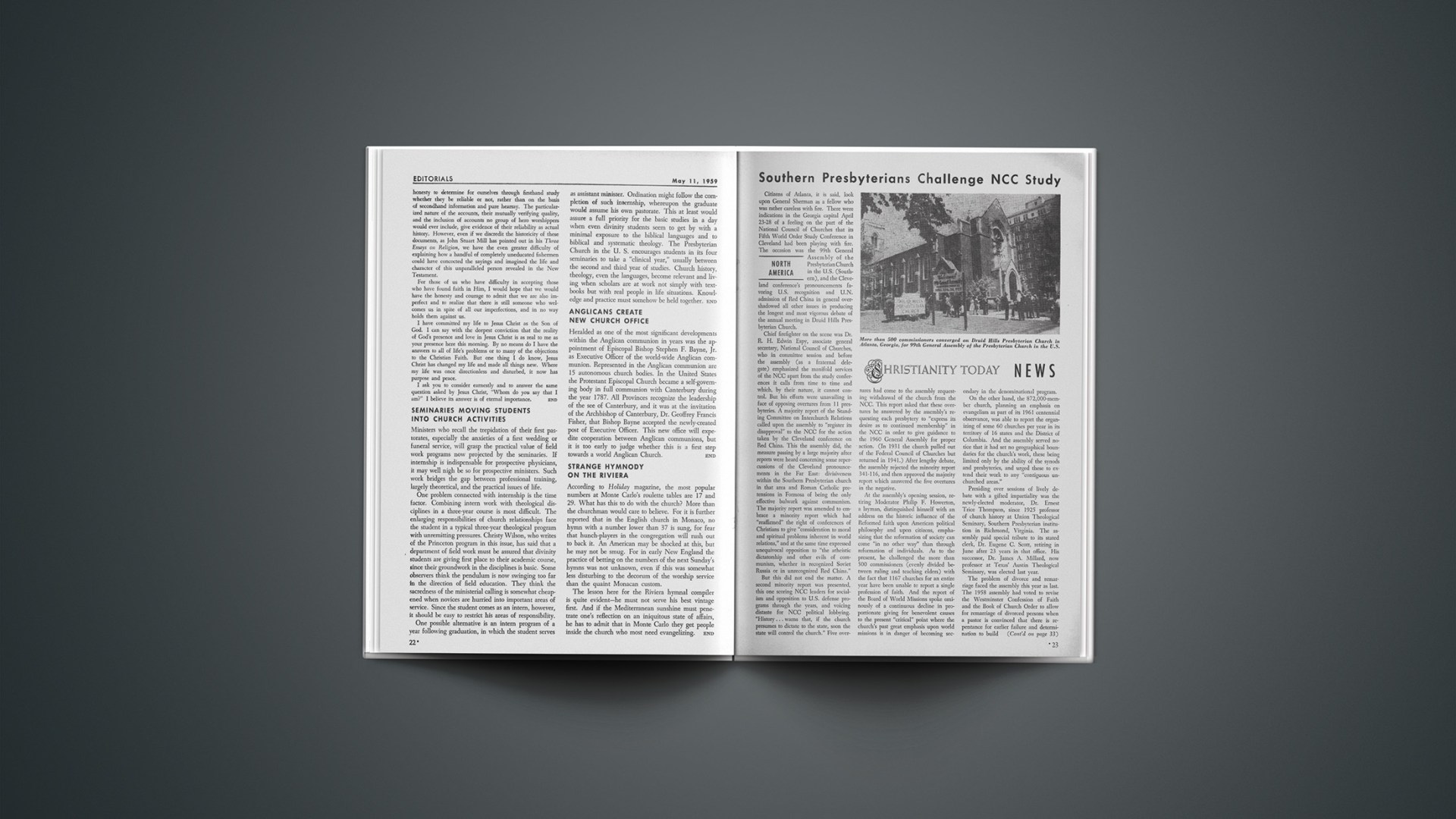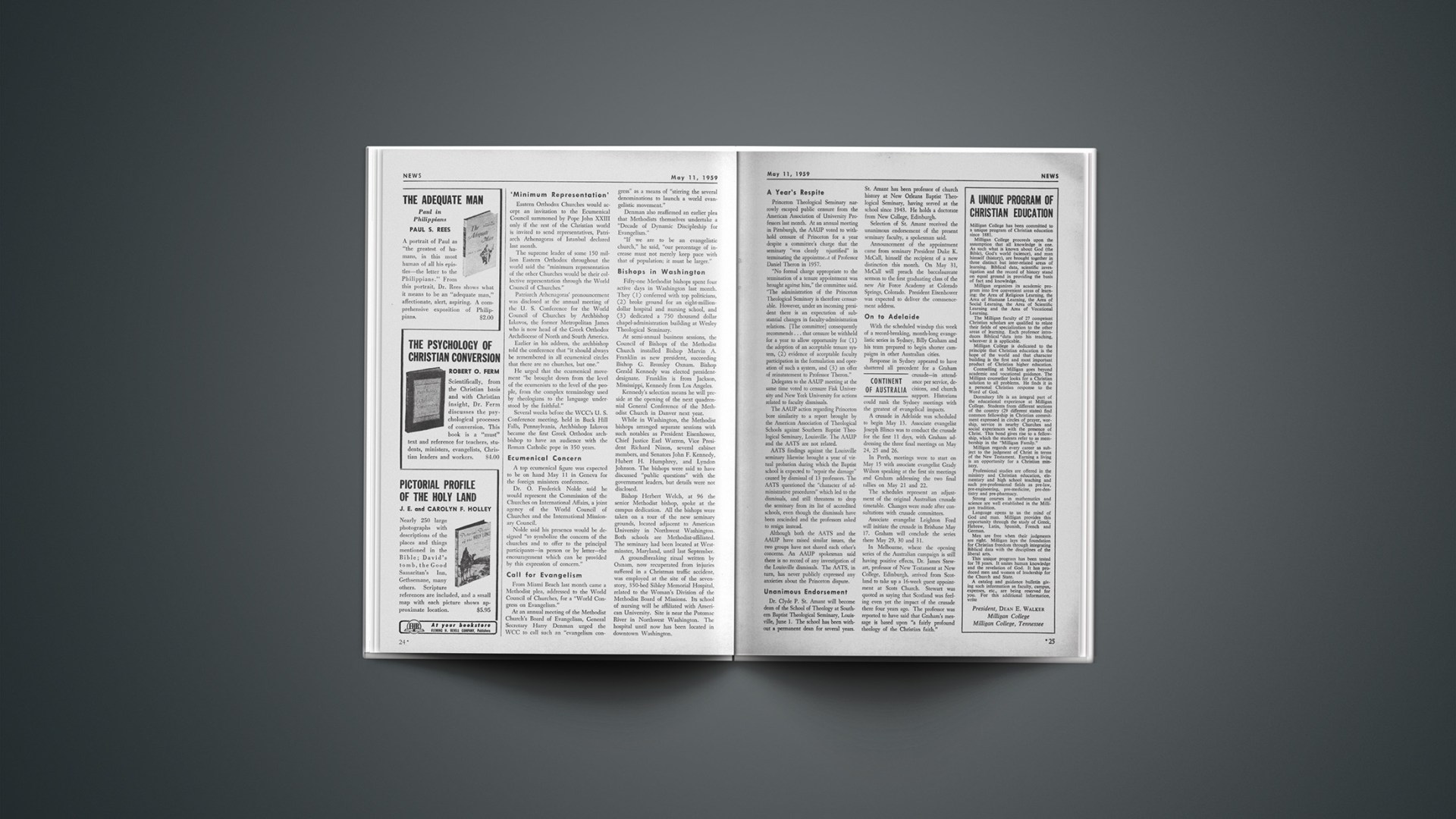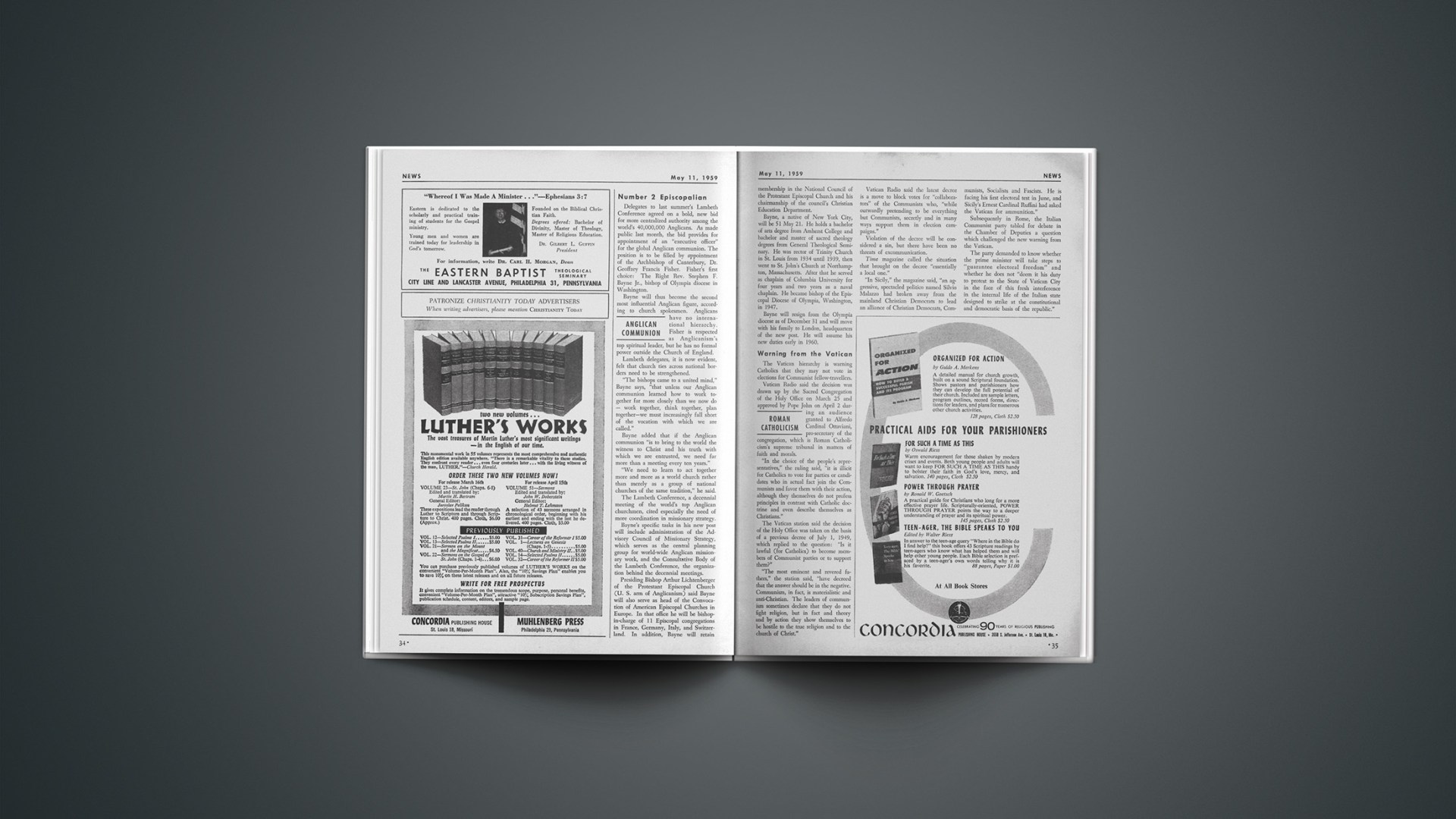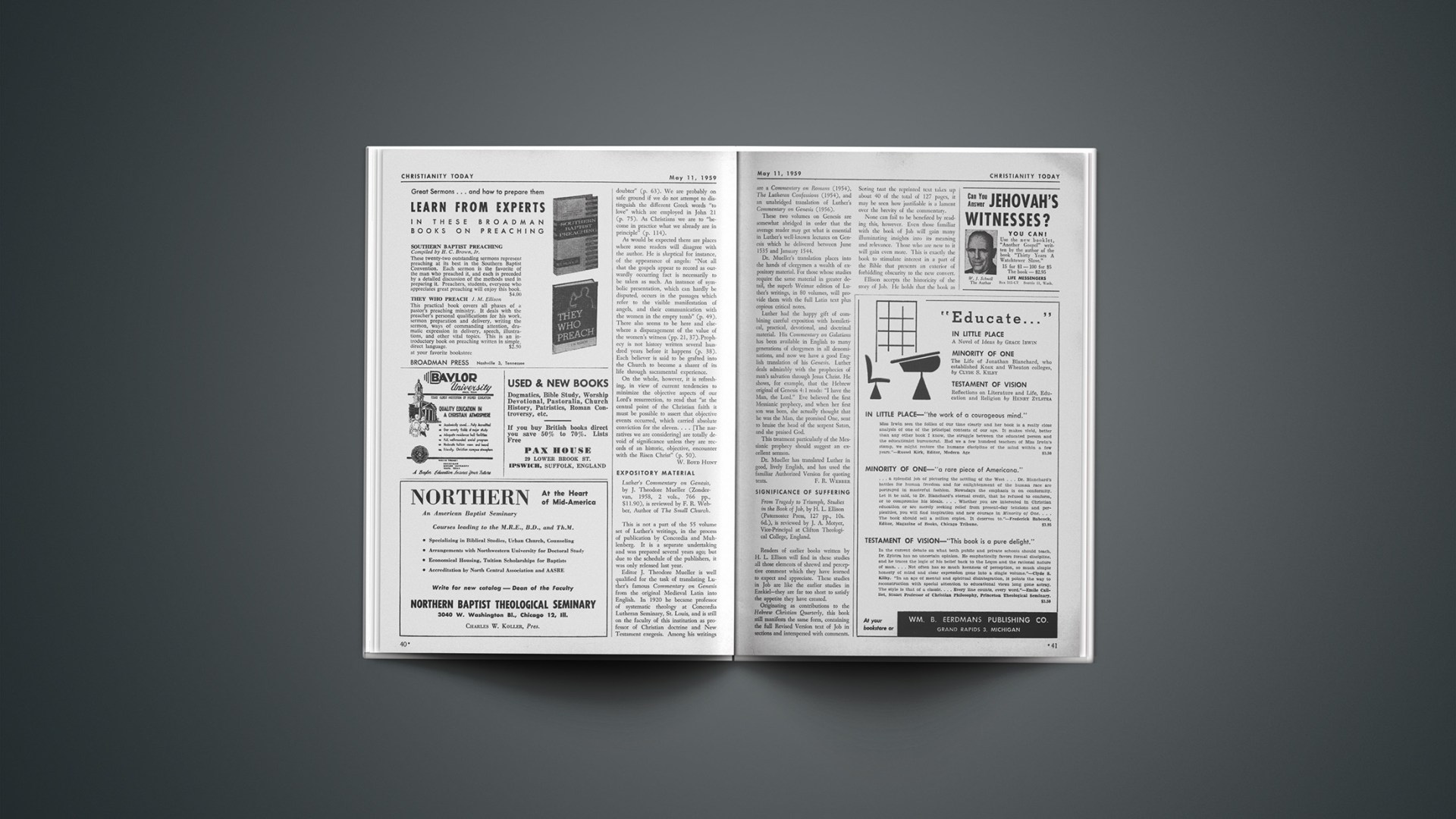The United States Office of Education reports that 1,341 institutions of higher learning conferred 411,058 earned degrees during the year 1956–57. Of this number 61,955 were master’s or professional degrees, representing from five to seven years of post high school study, and 8,756 were doctorates, representing seven years or more of post high school study. The balance consisted of four-year baccalaureate degrees. Honorary degrees, granted by these institutions, amounted to less than one per cent of the total.
How many counterfeit degrees were granted by illegitimate institutions and “diploma mills” is not known. But indications point to a large number, many of them going to ministers of the Gospel. In fact, considerable traffic in worthless degrees is being promoted by schools that claim to be “evangelical and conservative.” Fortunately, most preachers are discerning men and able to spot a fake degree as quickly as they would a phony three-dollar bill. And many lay leaders are equally discerning.
Some years ago the pulpit committee of a strong denominational church in the Midwest was shocked to find that the candidate about to be recommended as pastor had accepted an honorary degree from a “diploma mill.” Although he had been virtually assured of a call, his name was immediately dropped.
Unfortunately, however, not all church boards detect the false from the genuine. In my files I have the following formal invitation: “The P—— Church of P——, invites you to attend the special conferring service on the occasion of the completion of work by the pastor, Rev. John Doe, for the degree Doctor of Theology from the P—— Theological Seminary, on the morning of May 20, 1956 at 10:45 o’clock at the P—— Church. The Doctor of Divinity degree will also be bestowed honorarily.” The seminary referred to is a notorious “diploma mill” operating under several names. Its operator some time ago issued a reprint on the merits of correspondence study and pointed out that 10 million people have taken such courses. The implication was that all such courses must therefore be good. Clergymen who had not completed college and seminary were invited to earn degrees by correspondence. It was noted that this has been possible in England for 50 years. What was unsaid is that credits earned from this particular “institution” are not recognized by any reputable school, and that it is not the practice of accredited institutions in the United States to offer degrees by correspondence.
Several years ago an institution which had operated as a “seminary” in Delaware moved to Florida and continued operation under the same charter as a “liberal arts vocational college” and as a “theological seminary.” It offered 1,000 “Home Study Scholarship Awards,” reducing a year’s “tuition” from $120 to $90 if used within 15 days. As “honorary members” they listed several world-famous men. It is doubtful that these men knew how their names were being used. Many other good men have lent their names to similar projects apparently without investigating the institutions. In some cases an institutional charter changes hands repeatedly and its seat of operations moves from city to city and even from state to state.
Fraudulent Schools
In 1949 the Department of Higher Education of the National Education Association established a Committee on Fraudulent Schools and Colleges for the following purposes: 1. To make the public more aware of the continued existence of fraudulent institutions. 2. To encourage the teaching profession to warn youths and adults against such unscrupulous institutions. 3. To encourage state education officials to assume more responsibility for securing and enforcing legislation designed to eliminate so-called schools that give no real educational service to students.
In the New York Times (February 7, 1951) Benjamin Fine, school editor, estimated that more than 1,000 questionable or outright fraudulent schools and colleges exist in this country. The fraudulent institutions include so-called universities, colleges, seminaries, and schools lacking adequate libraries or laboratories, lacking standing with reputable institutions of learning, and engaged in the “racket” of selling degrees and diplomas. Some institutions make a pretense of having a few requirements, but it appears that any person with the “fee” can meet these without difficulty.
The NEA Committee believes that fraudulent institutions are in operation because “fraud in education has proved to be a profitable business for unscrupulous persons and because there are men and women who want to buy cheap degrees in order to deceive their employers or their associates by claiming degrees and credentials.” The Committee also finds that the laws of most states governing schools and colleges are so lax that racketeers are able to operate with impunity.
Suggestions offered for improving the situation include the following: 1. Stricter state laws. 2. Prosecution of fraudulent schools. 3. Insistence on honesty in advertising. 4. Requirement of evidence that a degree is from a reputable institution. 5. A deepening of conviction that it is dishonest to use any certificate, diploma, or degree issued by a school that lacks adequate recognition by appropriate educational authorities.
These are the standards of the world. The man standing behind the sacred desk can ill afford to bring reflection upon his message by employing lower standards in his personal life!
With shame we must admit that our conservative brethren in the ministry are more susceptible to worthless degrees than are the liberals. Why this should be true is difficult to understand. But many advertisements stress the orthodoxy of schools offering degrees by correspondence and thereby widen their appeal to evangelicals.
Tricks Of The Trade
To give a semblance of respectability, some schools will advertise themselves as members of a nonexistent educational association. One advertises itself as a member of the “National Association of Bible Schools,” another the “World University Association of Schools.”
One Chicago institution has been hailed into Federal court repeatedly by the Federal Trade Commission. When ordered to cease and desist, it merely changed its name sufficiently to get by the law and has gone right on advertising “courses.” A Federal court order instructed this institution to stop
representing, through the use of the symbols indicating academic degrees after the names of members of its faculty, or by any other means, that members of its faculty are educators duly qualified by a higher education, when the degrees so indicated are not the result of study pursued in residence at recognized colleges and universities duly authorized to grant the respective degrees indicated, or when the symbols of academic degrees used do not represent degrees actually granted by such institutions to such members of its faculty for attainment in the field of knowledge, and when the persons to whom the degrees represented by the symbols used are not teachers, educators, or persons of high educational attainment.
To begin with, this institution advertised itself as a “University.” When ordered to drop that name, it substituted the term “Graduate College” for “University.” Its next step was to drop “Graduate College” and add the word “Schools.” It then became a “Foundation.” The last title merely referred to it as a corporation. While not in the headlines recently, the same people seem still to be operating out of their Chicago office.
Fees vary anywhere from $15 or $20 “registration fee” (plus a contribution) up to $300 for a Doctor of Philosophy degree as advertised by a “seminary” in Nevada. To escape prosecution for selling worthless degrees some institutions suggest “monthly contributions” to cover expenses.
Correspondence Opportunities
Correspondence study has its place. Accredited courses given by reputable institutions may be taken by correspondence for college credit. In no case, however, will an accredited institution give a degree merely on the basis of correspondence study, and in most cases not more than one year or 30 semester hours of correspondence credit may be applied toward a four-year liberal arts degree. In practically every instance, the final year of work for any degree in an accredited school must be resident study. Some well-known correspondence schools have been operating on the highest ethical plane for many years, mostly on a high school or professional level. These are members of the National Home Study Council with office at 1420 New York Avenue, N.W., Washington 5, D. C. Much valuable training is available through these schools especially set up to teach by correspondence. The Council never recommends that students take correspondence courses if they are in a position to go to a resident college.
Although most correspondence courses are offered on a high school or professional level, many state and some privately endowed universities have extension departments offering correspondence study for college credit. “A Guide to Correspondence Study” may be secured for 25 ¢ from the National University Extension Association, University of Minnesota, in Minneapolis. A few reputable seminaries and Bible schools also offer correspondence studies. Not one, however, offers a degree by correspondence.
The Minister And His Study
That a pastor should be well trained none will deny. His interest in bettering himself and extending his preparation is to be commended. We would not imply that extension work should be discouraged nor that all training must bear the label “accredited” to be worthwhile. The writer believes in accreditation and feels that any school is strengthened when it achieves accreditation whether local or national. Yet we must distinguish between a school that is carrying on a reputable program, even though it may not yet be accredited, and the institution of doubtful standing which advertises correspondence courses that are leading to a degree, neither courses nor degree being of value to anyone.
No other major country is as lax as the United States in permitting shyster schools and diploma mills to sell certificates and degrees. Although the Federal Trade Commission has successfully prosecuted a number of “diploma mills” on the ground of unscrupulous and dishonest advertising through the mails, it has been able to do relatively little with local situations. To close down unscrupulous institutions is largely the responsibility of the several states.
At least 19 states required no state charter or license for a school to operate on the college level in 1953. However, 35 states issued lists of approved colleges in an effort to combat fraudulent institutions.
As Christians, what is our responsibility? First of all, we should do everything possible to deepen the conviction that it is dishonest to use any certificate, diploma, or degree issued by a “diploma mill.” The religious press has been strangely silent on this issue. Some have even carried “diploma mill” advertising! One denomination, however, went on record 10 years ago as “disapproving the acceptance of any academic degrees except such as have been earned in a recognized institution of higher education, or honorary degrees which are conferred by such accredited schools.” The step is certainly worthy of emulation by every denomination.
It is also a duty of Christian citizens to report bad practices to the Federal Trade Commission, Washington 25, D. C. Copies of letters, advertising, or catalogues should be included with these reports. The Commission will make investigations without involving the informant.
END
Preacher In The Red
PREACHING ON THE IMPOSSIBLE
Fresh out of the Seminary, I entered my first pastorate determined to make the best possible use of the local weekly newspaper in putting my church and its activities on the map. One feature of the weekly paper was a section devoted to church notices.
Approaching Mother’s Day, I thought I had a passable idea for a sermon: one that would deal with the way motherhood reaches outward, reaches forward, and reaches upward. How to gather these ideas together under one good catchy title? I finally settled on “The Farther Reaches of Motherhood” and hurried to the newspaper office with the Mother’s Day church notice.
Alas! The paper came out with the somewhat startling announcement, “Rev. Robb will preach on ‘THE FATHER REACHES FOR MOTHERHOOD.’ ”—The Rev. G. M. ROBB, Kansas City 3, Kansas.
Enock C. Dyrness has been Registrar and Director of the Summer School of Wheaton College since 1928. He holds the A.B. degree from Wheaton, A.M. from University of Chicago, and LL.D. (Hon.) from Houghton College. He is President of the National Association of Christian Schools.

